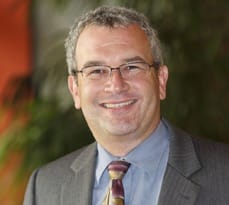The impact of energy technology is at the heart of the climate change debate, and Dr David Reiner, Senior Lecturer in Technology Policy, says it’s important to see both sides.


“I have to see both sides of the argument,” says Dr David Reiner, Senior Lecturer in Technology Policy at Cambridge Judge Business School, about his work on the thorny subject of fracking. “If my research is useful to both sides – large energy companies such as Shell and campaign groups such as Greenpeace and Friends of the Earth – then I am doing my job.”
Reiner specialises in regulatory design, environmental policy and understanding the public acceptability of energy technology and environmental policy. Part of his work is to understand why some new technologies evoke more opposition – and why some firms are more successful than others in convincing the public to accept them, whether that be smart meters, carbon capture and storage, or fracking.
A graduate of Princeton and MIT, Reiner claims he became an academic by accident. Growing up in the cold of Montreal, energy had always played a big part in his life. “At the time, a huge dam was being built at James Bay to supply the city with power, and there were many controversies and massive budget over-runs. From an early age, large infrastructure projects played a part in my consciousness.”
Although passionate about history and politics, he nevertheless chose to study physics as an undergraduate in Canada, going on to do an MA in plasma physics at Princeton. He was studying at, as he describes it, “a hundred million dollar US government funded lab” when a change in Congressional leadership brought about budget cuts. “And suddenly the key role of government in academic study, and particularly energy policy, became even clearer to me”.
At that initially well-funded lab, the Assistant Director Rush Holt was highly politically involved, going on to run for Congress, and “while I was figuring out what to do with my life” Reiner worked for him as an intern. He found that he enjoyed the policy side of things so much that he took a job at a large Washington-based consultancy, whose principal client was the US Environmental Protection Agency.
Three years later, though, he was back studying, this time for a PhD in politics at MIT. And this time he was to stick to academia. “What drew me back was the sense of being able to be critical, not having to accept the party line or tell the client what they wanted to hear,” he explains.
Now an assistant director of the Energy Policy Research Group based at Cambridge Judge Business School, he continues to be fascinated by the balance between science and politics. “It is challenging – politicians will say that there are usually two legitimate opposing sides to an argument, whereas science strives for right answers. It is somewhat ironic that while scientists have a subtle understanding of the complex issues within their sphere of interest they have no doubt about the desired direction of progress, while for politicians there is inherent complexity and ambiguity to decision-making which makes politics all about doubt. I hope that having been on both ideas of the equation I can speak for both sides – and understand their frustrations.”
Just as in his work, in his own life Reiner is a pragmatist, recognising the challenges that come with issues around climate change. His own solution would be to tax carbon emissions much more than we do today. “Responding individually is simply not viable. We can’t rely on individual consciousness to make enough difference in a short amount of time. We need to act in a mandatory or regulatory way rather than waiting on a dawning awareness of the plight the planet is in. My students may be more aware of climate change than my parents’ generation but that consciousness doesn’t necessarily translate into action.”
Reiner is no tub-thumping environmentalist though. “All academics think what they are doing is important,” he says, “but I know that I benefit from working in a really active area right now. We have to find a way that is both politically and personally acceptable to confront the challenges of climate change.”

